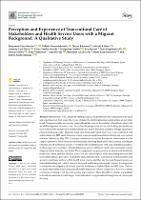Por favor, use este identificador para citar o enlazar este ítem:
https://repositorio.usj.es/handle/123456789/705
| Título : | Perception and Experience of Transcultural Care of Stakeholders and Health Service Users with a Migrant Background: A Qualitative Study |
| Autor: | Gaya-Sancho, Benjamín


Vanceulebroeck, V. 

Kömürcü, N. 
Kalkan, Idrani 


Casa-Nova, Antonio 


Tambo Lizalbe, Elena 

Coelho, Margarida 


Present, Evy 
Değirmenci Öz, Seda 

Soares-Coelho, Teresa 

Vermeiren, Sofie 
Kavala, Arzu 

Jerue, Benjamin Adam 

Sáez-Gutiérrez, Berta 
Antón-Solanas, Isabel 


|
| Palabras clave : | Nurses; Cultural competency; Healthcare system; Qualitative research; Transcultural nursing; Culture awareness |
| Fecha de publicación: | 7-oct-2021 |
| Editorial : | MDPI |
| Citación : | Gaya-Sancho, B.; Vanceulebroeck, V.; Kömürcü, N.; Kalkan, I.; Casa-Nova, A.; Tambo-Lizalde, E.; Coelho, M.; Present, E.; Değirmenci Öz, S.; Coelho, T.; Vermeiren, S.; Kavala, A.; Jerue, B.A.; Sáez-Gutiérrez, B.; Antón-Solanas, I. Perception and Experience of Transcultural Care of Stakeholders and Health Service Users with a Migrant Background: A Qualitative Study. Int. J. Environ. Res. Public Health 2021, 18, 10503. https://doi.org/10.3390/ijerph181910503 |
| Resumen : | Introduction: While European health policies do frequently take into consideration the ideas and experiences of their users, the voices of minority and marginalized communities are not often heard. European healthcare services must address this issue as the number of healthcare users with an MM background increases. Aim: To explore the perspectives of key stakeholders and healthcare users with an MM background on transcultural care in four European countries. Design: Qualitative phenomenological study. Methods: Semi-structured, individual interviews were conducted with stakeholders and MM users. Interviews were translated and transcribed verbatim and were carried out from February to May 2021. Descriptive statistics was used to describe the characteristics of the sample; qualitative data were analyzed thematically following Braun and Clarke's phases, resulting in 6 themes and 18 subthemes. Results: For stakeholders and MM users with long-established residence in their respective countries, cultural differences involve different family and community norms, religious beliefs, lifestyles, and habits. These components are perceived as in tension with healthcare norms and values, and they mediate in two key and related aspects of the relationship between MM users and healthcare providers: accessibility and communication. Conclusions: Communication and access to healthcare are key to MM health service users, and they are the most frequent sources of misunderstanding and conflict between them and healthcare professionals. Impact: It is important to extend the investigation of cultural issues in healthcare to stakeholders and MM users. There is no doubt that healthcare professionals should be trained in cultural competence; however, cultural competence training is not the only area for improvement. There should be a change in paradigm in healthcare services across Europe: from individual to organizational integration of culture and diversity. |
| URI : | https://repositorio.usj.es/handle/123456789/705 |
| ISSN : | 1661-7827 |
| Aparece en las colecciones: | Artículos de revistas |
Ficheros en este ítem:
| Fichero | Descripción | Tamaño | Formato | |
|---|---|---|---|---|
| Perception and Experience of Transcultural Care of Stakeholders and Health Service Users with a Migrant Background A Qualitative Study.pdf | 430,26 kB | Adobe PDF |  Visualizar/Abrir |
Este ítem está sujeto a una licencia Creative Commons Licencia Creative Commons

